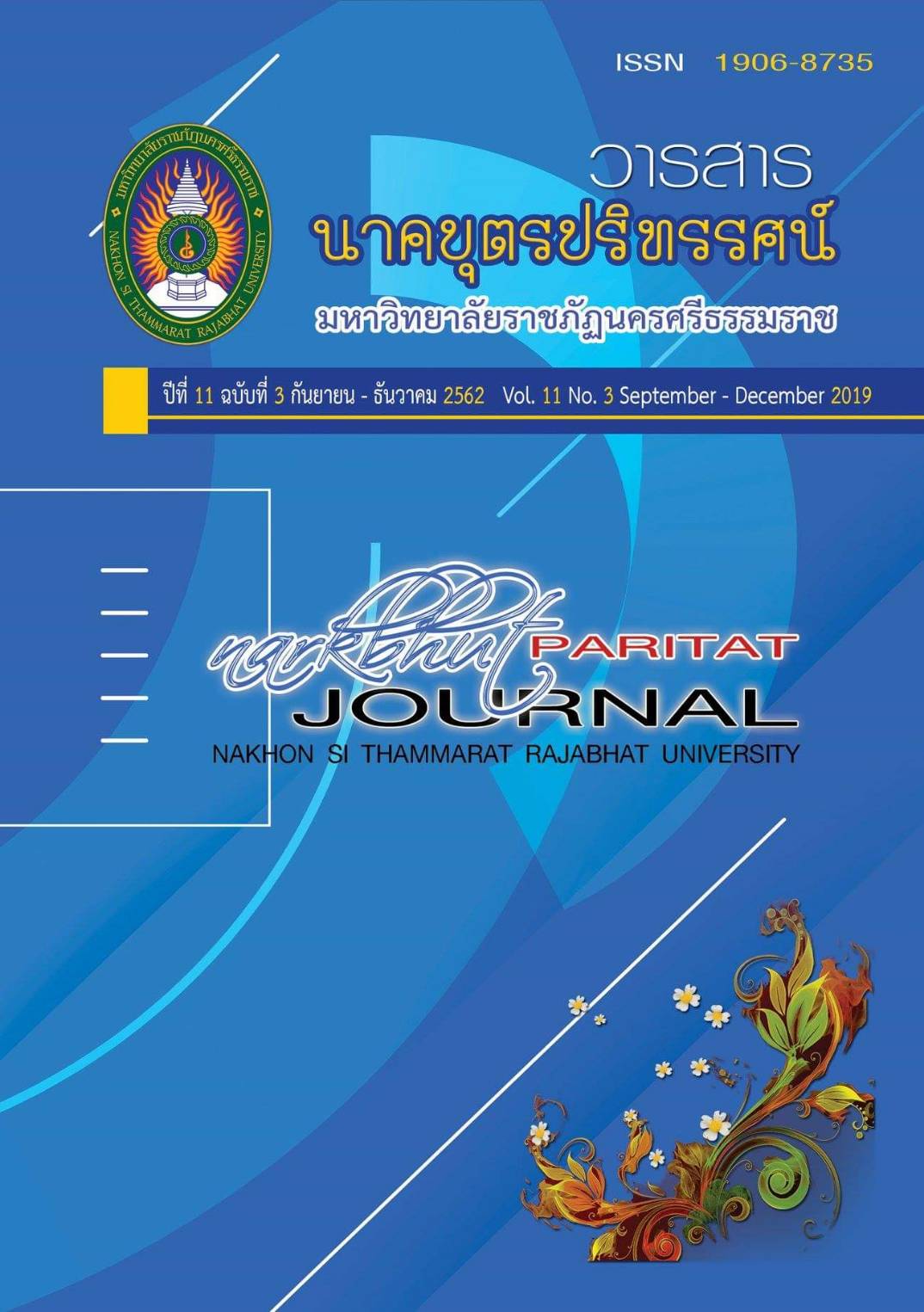รูปแบบการบริหารจัดการน้ำแบบบูรณาการและยั่งยืนโดยการมีส่วนร่วมของโครงการส่งน้ำและบำรุงรักษาลุ่มน้ำโก-ลก จังหวัดนราธิวาส Model of Water Management in Term of Integrated and Sustainable by Participation in the Ko-Lok’s Irrigation Project in Narathiwat Province
Main Article Content
บทคัดย่อ
การวิจัยนี้มีวัตถุประสงค์เพื่อ 1) ประเมินสภาพปัญหาการบริหารจัดการน้ำของโครงการส่งน้ำและบำรุงรักษาลุ่มน้ำโก-ลก จังหวัดนราธิวาส 2) พัฒนารูปแบบการบริหารจัดการน้ำแบบบูรณาการและยั่งยืนโดยการมีส่วนร่วม และ 3) เสนอแนะเชิงนโยบายและแนวทางในการบริหารจัดการน้ำของโครงการส่งน้ำและบำรุงรักษาลุ่มน้ำโก-ลก จังหวัดนราธิวาส โดยมีการดำเนินการวิจัยเชิงผสม ประกอบด้วยการวิจัยเชิงปริมาณ และเชิงคุณภาพ ประชากรที่ใช้ในการวิจัยแบ่งออกเป็น 3 กลุ่ม ได้แก่ ประชากรที่อาศัยอยู่ในบริเวณพื้นที่ลุ่มน้ำโก-ลก จังหวัดนราธิวาส ผู้นำเกษตรกรและชุมชนที่มีส่วนได้ส่วนเสีย และหน่วยงานภาครัฐที่เกี่ยวข้องกับการบริหารจัดการน้ำ รวมจำนวน 50,271 คน โดยกลุ่มตัวอย่างที่ใช้ในการวิจัยแบ่งเป็น 2 ส่วน ได้แก่ กลุ่มตัวอย่างในการวิจัยเชิงปริมาณ ได้แก่ ประชากรที่อาศัยอยู่ในบริเวณพื้นที่ลุ่มน้ำโก-ลก จากการสุ่มแบบหลายขั้น จำนวน 400 คน และกลุ่มตัวอย่างสำหรับการวิจัยเชิงคุณภาพ ได้แก่ ตัวแทนผู้นำเกษตรกรและชุมชนที่มีส่วนได้ส่วนเสีย และหน่วยงานภาครัฐที่เกี่ยวข้องกับการบริหารจัดการน้ำ โดยการสุ่มแบบเจาะจง รวมเป็น 100 คน เครื่องมือที่จะใช้ในการวิจัยประกอบด้วย 2 ส่วน คือ 1) แบบสอบถามสำหรับการวิจัยเชิงปริมาณ และ 2) แบบสัมภาษณ์และการสนทนากลุ่มสำหรับการวิจัยเชิงคุณภาพ ผู้วิจัยดำเนินการจัดกระทำข้อมูลและวิเคราะห์ข้อมูลโดยใช้โปรแกรมสำเร็จรูปเพื่อวิเคราะห์ข้อมูลโดยใช้สถิติเชิงพรรณนา ได้แก่ ค่าสูงสุด ค่าต่ำสุด ค่าเฉลี่ย ส่วนเบี่ยงเบนมาตรฐาน สถิติที่ใช้ในการวิเคราะห์ได้แก่ ค่าเฉลี่ย ค่าเบี่ยงเบนมาตรฐาน และวิเคราะห์ข้อมูลที่ได้จากการสัมภาษณ์และการสนทนากลุ่มโดยการวิเคราะห์เนื้อหา และนำเสนอผลการวิเคราะห์แบบพรรณนาความ
ผลการวิจัยพบว่า 1) สภาพปัญหาในปัจจุบันของการบริหารจัดการน้ำในโครงการชลประทานของน้ำ โก–ลก จังหวัดนราธิวาส ขาดการมีส่วนร่วมในการพัฒนาแบบบูรณาการแบบยั่งยืนทำให้ผู้ใช้น้ำในโครงการไม่เข้าใจแนวคิดการจัดการน้ำดังกล่าว นอกจากนี้ระดับการมีส่วนร่วมของชุมชนในการจัดการน้ำตามแนวปรัชญาเศรษฐกิจพอเพียงอยู่ในระดับปานกลาง 2) รูปแบบการจัดการน้ำของโครงการชลประทานโก–ลก ควรมุ่งเน้นไปที่การจัดการปัญหาภัยแล้ง น้ำท่วม น้ำทะเลขึ้นสูงและความเป็นกรดของน้ำ ตามแนวคิดปรัชญาเศรษฐกิจพอเพียงของในหลวงรัชกาลที่ 9 ได้แก่ ความรู้ ความดี ความมีเหตุผล ความพอประมาณและภูมิคุ้มกัน นอกจากนี้ความร่วมมือจากทุกคนในโครงการชลประทานสามารถนำไปสู่การพัฒนาที่ยั่งยืนตามแนวคิดปรัชญาเศรษฐกิจพอเพียง ซึ่งเป็นวิธีการที่สามารถใช้ในการพัฒนาแบบบูรณาการและยั่งยืนโดยการมีส่วนร่วมในการก่อสร้าง การดัดแปลงและการปรับปรุงอาคารชลประทานในพื้นที่โครงการ 3) นโยบายและแนวทางการบริหารจัดการน้ำของโครงการชลประทานโก–ลก ต้องพัฒนาทักษะและเทคนิคการมีส่วนร่วมของชุมชนในการจัดการน้ำด้วยปรัชญาเศรษฐกิจแบบยั่งยืนและพอเพียง โครงการควรจัดลำดับความสำคัญของการพัฒนาทรัพยากรมนุษย์และศูนย์การเรียนรู้ ส่งเสริมให้ชุมชนตระหนักถึงความสำคัญของเทคนิคการเรียนรู้และกระบวนการคิด ในท้ายที่สุดเพื่อกระตุ้นให้พวกเขาเรียนรู้และสามารถวิเคราะห์ปัญหาที่พวกเขาเผชิญและสามารถใช้ความรู้ที่พวกเขาเรียนรู้เพื่อการพัฒนาที่ยั่งยืนแบบพอเพียงได้ แนวทางการวิจัยในอนาคตควรศึกษาบทบาทหรือการมีส่วนร่วมของชุมชนในการประยุกต์ใช้แนวคิดการจัดการน้ำตามปรัชญาเศรษฐกิจพอเพียงแบบยั่งยืนเพื่อส่งเสริมให้ผู้คนฝึกฝนในพื้นที่
The objectives of this research show as following; 1) To estimate the present of water management situation of Ko-Lok’s irrigation project, Narathiwat province of Thailand, 2) To develop the water management model of the project in term of integrated and sustainable by participation and 3) To improve the water management performance of Ko-Lok’s irrigation project by suggested the water policy and guideline. This research conducted by the using of a mixed method that consisting of quantitative research and qualitative research. The population used in this research is divided into 3 groups, namely, the population that lives in the area of the Ko-Lok Basin in Narathiwat Province, farmers and interested communities, government agencies involved in water management, a total of 50,271 people. The sample group in this research is divided into 2 parts: the first sample group of quantitative research is the population living in the area of the Ko-Lok Basin. Obtained from the Multi-Stage Sampling of 400 persons and the second sample group used in qualitative research was the representatives of farmers, community stakeholders and government agencies involved in water management obtained by purposive sampling with a total of 100 people. The instruments to be used in this research consisting of 2 parts: 1) the questionnaires for quantitative research and 2) the interview questionnaires and group discussions for qualitative research. The researcher conducted the data preparation and analyzed by using the statistic software package with descriptive statistics including maximum, minimum, average, and standard deviations. The statistics for data analysis are mean and standard deviation. The analysis of data obtained from interviews and group discussions by content analysis and present the results by descriptive representation.
The results of the research indicated that 1) the problem of water management of the Ko-Lok’s irrigation project is lacking participation developed in term of integrated and sustainable, so that, the water users in the project are misunderstood the according to the concept of water management. Moreover, the level of community participation in water management in term of sufficiency economic philosophy is in the moderate zone. 2) the water management conformation of the Ko-Lok’s irrigation project mainly focuses on drought, flooding, the high sea water, and acidic water. By using the sufficiency economy of King Rama 9’s philosophy including Knowledge, Virtue, Reasonableness, Modesty, and Immunity. Furthermore, the cooperative from everyone in the irrigation project can lead to sustainable development. According to the King’s philosophy, the method that can be used for integrated and sustainable development with participation in construction, modification, and renovation the irrigation buildings in the project area. 3) the policy and guideline of water management of Ko-Lok’s irrigation project had to improve participate skills and techniques of community in water management with sustainable and sufficiency economic philosophy. The project should prioritize the human development and learning center. Encourage the community to realize the crucial of learning technique and thinking processes. Ultimately, to encourage them to learn and analyze the problem solving that they facing and able to use the knowledge that they have learned for sustainable and sufficiency development. Future research should study the role or participation of communities in applying water management concepts in accordance with the sufficiency economy philosophy. Sustainable to encourage people to practice in the area.
Article Details
เอกสารอ้างอิง
Inwang, K. (2012). Research methodology. Phitsanulok: Phitsanulok University Printing Center. (In Thai)
Phanturat, P. (2015). Effectiveness of water resource management for agriculture in the Chi River basin. Journal of Graduate Studies, 2 (2), 182-194. (In Thai)
Phongmesa, W. (2007). Participation of farmers who use irrigation water to the Huai Bang Phuan Reservoir Project, Tha Bo District, Nong Khai Province. (Master of Public Administration Thesis), Faculty of Public Administration, Rajabhat Maha Sarakham University). (In Thai)
Yamane, T. (1973). Statistics: An Introductory Analysis, 3rd Ed. New York: Harper and Row Publications.


